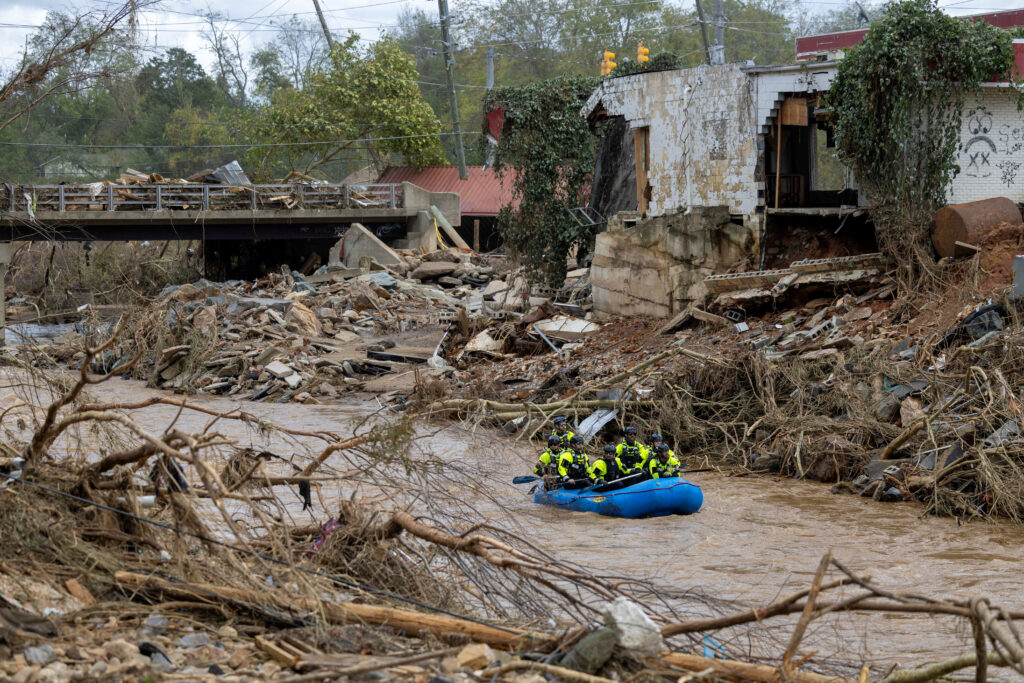Note: I will be traveling over the next couple of days so blog posts will be appearing at irregular times. By Wednesday Julia and I will be settled down in Slovenia, where I have a six-week stint teaching at the University of Ljubljana. More on that in future posts.
Tuesday
Watching the devastating impact of Hurricane Helene on Swannanoa, North Carolina—the town was literally swept away—is our most recent reminder of the havoc that lies in store for us as the world heats up. While Donald Trump and Project 2025 claim that climate change is a hoax—and propose measures that will make it even worse—Florida, Georgia, Tennessee and North Carolina are witnesses to the latest instance of what happens when the Gulf of Mexico becomes abnormally warm. And this, as the world knows to its sorrow, is only one of the extreme weather events that we humans have unleashed upon ourselves with our excessive hydrocarbons.
As climate scientists—“mad-eyed from stating the obvious” (to quote from the poem I share today)—search for ways to communicate the horrors that are in store for us, poet Richard Wilbur has some advice. To be sure, “Advice to a Prophet” is speaking of nuclear annihilation rather than climate change, but the poem’s advice still holds.
As Wilbur sees it, warning about “weapons, their force and range,/ The long numbers that rocket the mind” doesn’t effectively communicate the dangers of nuclear proliferation. Wilbur observes that, in the face of such language, our “slow, unreckoning hearts” may be “left behind, unable to fear what is too strange.” Perhaps the same happens when climate scientists warn about glacier melt or sea level rise.
Instead, Wilbur says, our doomsday prophets should speak of “the world’s own change.” After all, we know what it’s like to see the world being degraded before our eyes. “Though we cannot conceive/Of an undreamt thing,” the poet notes, “we know to our cost/ How the dreamt cloud crumbles, the vines are blackened by frost,/ How the view alters.”
As I watch television footage of trees being swept away in the deluge, I think of Wilbur’s jack-pine losing “its knuckled grip on the cold ledge.” And while the hurricane-maddened rivers aren’t killing all the “gliding trout” the way a nuclear blast would, they have been claiming other victims. When Wilbur asks whether we will understand what it means to be “lofty and long standing/ When the bronze annals of the oak-tree close,” I think of those other trees that climate change is killing, whether through insects migrating north or (in the tropics) through dehydration.
Here’s the poem:
Advice to a Prophet
By Richard Wilbur
When you come, as you soon must, to the streets of our city,
Mad-eyed from stating the obvious,
Not proclaiming our fall but begging us
In God’s name to have self-pity,
Spare us all word of the weapons, their force and range,
The long numbers that rocket the mind;
Our slow, unreckoning hearts will be left behind,
Unable to fear what is too strange.
Nor shall you scare us with talk of the death of the race.
How should we dream of this place without us?—
The sun mere fire, the leaves untroubled about us,
A stone look on the stone’s face?
Speak of the world’s own change. Though we cannot conceive
Of an undreamt thing, we know to our cost
How the dreamt cloud crumbles, the vines are blackened by frost,
How the view alters. We could believe,
If you told us so, that the white-tailed deer will slip
Into perfect shade, grown perfectly shy,
The lark avoid the reaches of our eye,
The jack-pine lose its knuckled grip
On the cold ledge, and every torrent burn
As Xanthus once, its gliding trout
Stunned in a twinkling. What should we be without
The dolphin’s arc, the dove’s return,
These things in which we have seen ourselves and spoken?
Ask us, prophet, how we shall call
Our natures forth when that live tongue is all
Dispelled, that glass obscured or broken
In which we have said the rose of our love and the clean
Horse of our courage, in which beheld
The singing locust of the soul unshelled,
And all we mean or wish to mean.
Ask us, ask us whether with the worldless rose
Our hearts shall fail us; come demanding
Whether there shall be lofty or long standing
When the bronze annals of the oak-tree close.
Xanthus, incidentally, is the mythical river that rose up in horror from all the Trojan bodies that Achilles, in his wrath, was casting into it. As its waves attempted to drown the Greek warrior, the Greek god Hephaestus, the blacksmith god, sent down holy fire, forcing the river to retreat. In other words, it’s a powerful image to use by a poet warning of nuclear Armageddon. It also works well to capture how modern technology is upsetting the natural order.


